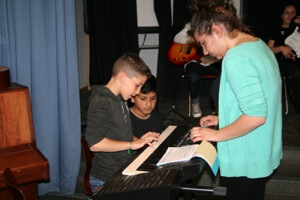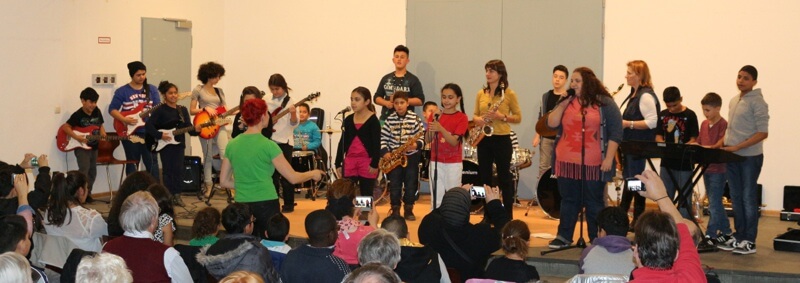 Beats for Kids
Beats for Kids
Difficult access to education, racism, and violence in the social hotspot Rollberg quarter of Berlin-Neukölln
In the Rollberg quarter in Berlin-Neukölln, over 30 nationalities live side by side, although, interactions between the different nationalities is very limited. The daily life between the various population groups is characterized by indifference towards each other at best, often prejudices, racism, and sometimes even violence. In order to stimulate communication between the children and teenagers of different backgrounds, targeted approaches are necessary. The MORUS association created a new platform for intercultural dialogue based on music, by founding the 'Big Band Rollberg' under the direction of Sandra Weckert, a music teacher. In the orchestra, other rules apply than 'on the street'. The usual competitiveness is replaced by the cooperation of all. Here, background and nationality don't play a role. The children experience solidarity and share their success.
Necessity
Strengthen personal responsibility and self-confidence, improve communication, and reduce prejudices.
Activity
Establishing a Big Band for children and teenagers without previous music skills, weekly rehearsals and regular performances.
Countable effort
Number of children and teenagers who participate in the orchestra
Result
Amount of children and teenagers who can play an orchestra instrument
Systemic effect
New encounters are made possible, new friendships develop, prejudices are reduced, and neighborly interactions are promoted
Background
The Rollberg quarter in Berlin-Neukölln is a new residential building complex, home to around 5,600 residents from 30 different countries. 70 percent of the residents are immigrants. For several years, the neighborhood ranks very low in the Social Structure Atlas of Berlin, with 70 percent of the residents receiving governmental social welfare payments. Yet, the main problem is not poverty but a lack of equal access to education. The children need role models to show them an organized working life. Most families are often not able to support their children, whether the familiy has a migration background or not. The school drop out rates are high, with most teenagers having only achieved a very low general education and low social competences the time they leave school. In many families, other problems arise like alcoholism or domestic violence. The children are often raised in a way that their perspective does not extend beyond the life in the neighborhood or their extended family.
The good deed
In the 'Big Band Rollberg', the children experience a mix of cultures, backgrounds, genders, and ages. They discover that mutual respect, consideration, and active listening are indispensable for a good interaction with each other. They understand the experience of making music as a cooperative effort of the group in which each and everyone is contributing to the final success. Every child can become a member of the Big Band. No previous music skills are required. In order to set up a complete music performance in a limited period of time, Sandra Weckert selects well-known rock songs (e.g. AC/DC, The Eagles). For most children this is a completely new experience: they were previously only passive consumers of music and the media, however, they are now transformed into active performers.
Challenge
The daily life of the children and teenagers is dominated by family life and the desire for consumption goods. Frustration tolerance and patience are usually very low. It is important that small achievements and the feeling of success are reached quickly. Another challenging factor is the limited organization and attention span of many children.

AboutGermany
Berlin
Capital
80.781.000
Number of inhabitants
44,999 USD
Gross domestic product per capita per year
5
Human Development Index
With regard to the GDP, Germany is the largest economy in Europe and the forth-largest worldwide.
About the organization and further information
Association
Förderverein Gemeinschaftshaus MORUS 14 e.V.
PHINEO




